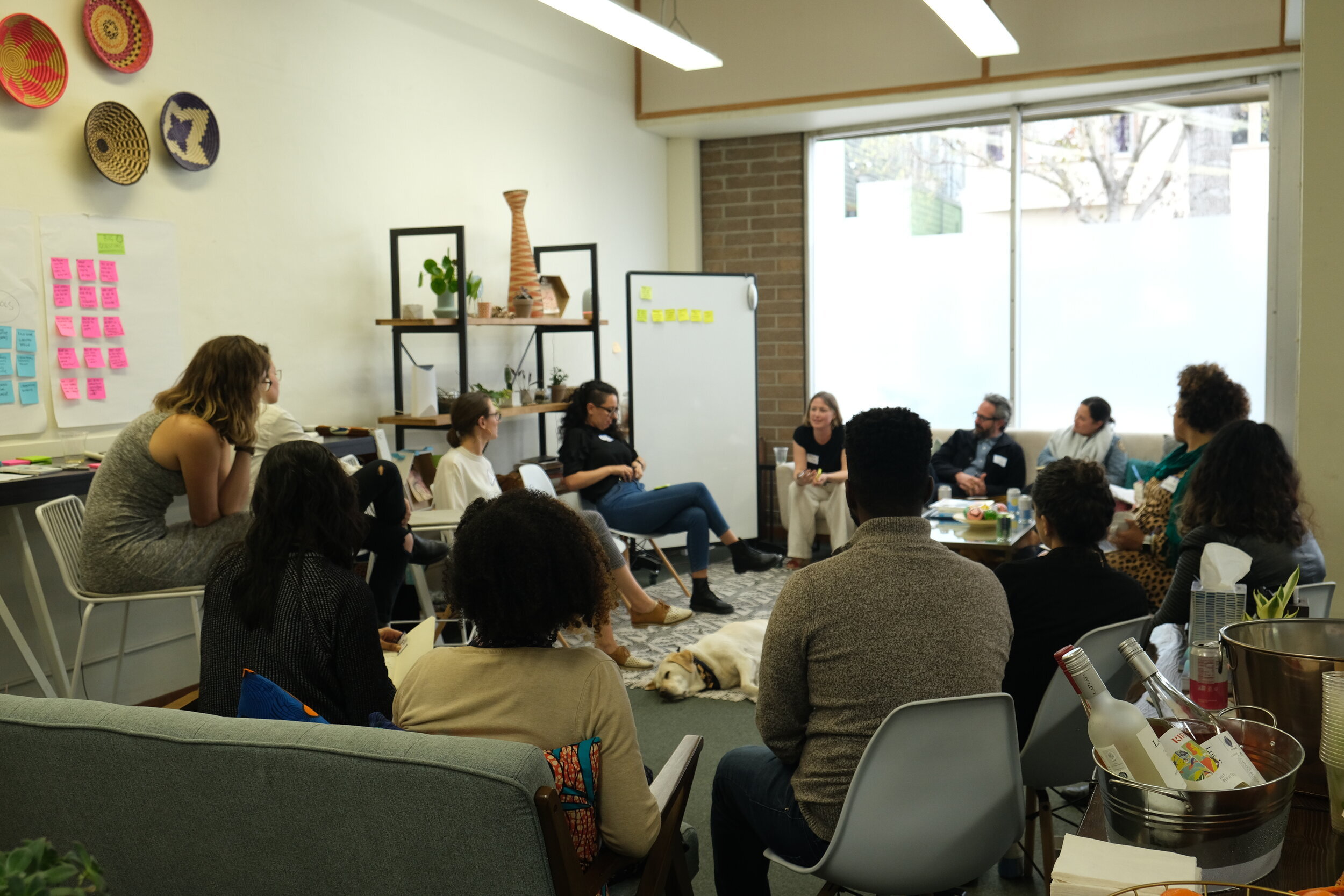Power and equity in design
Earlier this year, YLabs hosted a small group to discuss how power, privilege, and social inequity can impact designers, the design process, and the solutions that we create.
“The idea to hold this gathering grew from a conversation at a design meetup,” said YLabs Executive Director Dr. Rebecca Hope. “There are so many people out there who are excited about design, but not enough conversations about the importance of privilege and power in the design process, and how to consider equity when building valuable and sustainable solutions.”
At YLabs, we are constantly faced with questions surrounding power and equity in our work, and we know that other people and organizations have been thinking deeply about similar questions. We were proud to partner with Olivia Nava of Gobee Group and Sarah Fathallah of Design Gigs for Good, two leaders in the Bay Area’s robust design community, to develop a forum to create space for these conversations.
“We want to build this community to learn from each other, share better practices, and be intentional about how we consider equity in our work,” said Nava. “We work in a competitive space, but at the end of the day, it’s about doing better work with communities, how to be of better service to those communities.”
We welcomed the small group of Bay Area designers and design researchers to the YLabs office and spent the afternoon sharing our experiences and challenges we have faced as designers in confronting power dynamics during different phases of the design process.
Theo Gibbs, a Design Lead at YLabs, described an experience she had during the design research phase of Beyond Bias. “In Pakistan, the social norm is for young girls to be accompanied by their mother in law to something like an interview -- and the mother-in-law does the talking and responding,” said Gibbs. “The challenge for us as designers and outsiders was to figure out how to respectfully honor this social convention while also finding ways to elevate the voices of young Pakistani women to speak about their own body and their own experiences.”
Sarah Fathallah, co-founder of Design Gigs for Good, reflected on her experience as a designer and researcher in international contexts: “Designers are in a privileged place to be able to facilitate the process. We get to decide who is in the room, who participates, and whose voice is heard in product development. We need to ask ourselves how we are perpetuating imperialistic processes, especially in the social sector. We have power over the process, the decision, and the outcomes.”
“We need to approach engagements from a community asset lens,” continued Fathallah. “What are some of the ways that the community already explores problems, conducts consultations, makes decisions, and proposes solutions that we can elevate by bringing our design skills to the table?”
A key theme in the discussion was the importance of turning the lens on ourselves as designers and analyzing the ways that being in the position of a designer or researcher can create imbalanced power dynamics, even if the designer shares identities and life experiences with the participants. Dr. Shola Olabode-Dada, a Behavioral Scientist at YLabs, shared about a time when she was called out on her privilege while conducting research with students at an HBCU: “As a Black person, I didn’t think that I was being extractive when I was conducting research with the students. I didn’t think I was harming my community in that way,” said Dr. Olabode-Dada. “As a researcher, I needed to be more transparent and convey why I was there and what I’d be doing with the findings.”
In the session, the group shared their experiences, tools that we use in our own work, and began to ruminate on several key questions:
How does the design process re-enforce existing structures of hierarchy, exclusion, and resource distribution, particularly along the lines of race, class, gender, and physical or literacy ability?
Who bears the costs of the design research process; who gets the benefits; and how might these be distributed more equitably?
What does it look like to shift power and put decision-making in the hands of participants through the design process?
How can we make equity the norm in design?
How can people working in this field acknowledge and confront their own privilege? How do we hold each other accountable in our work?
How do we make the design process truly collaborative?
Participants also shared some existing tools and communities that are helping them navigate these types of questions:
Design Justice Network and their “Ten Principles of Design Justice”
AORTA: Bay Area training collective on anti-oppressive facilitation tactics
Beyond the Binary: 5 Steps to Gender Inclusive Forms in Your Product
“Design Justice” (New book from MIT press) -- Introduction to the book is available for free here.
Looking ahead, we are asking ourselves how we can normalize discussions about power and privilege within the broader design community so that these reflections are a standard part of the design process. We are so grateful to have been able to create space for these conversations with some of our favorite people - and we can’t wait to grow the circle! We are currently planning our next virtual Power & Equity in Design event! If you would like to participate, follow us on social media or sign up for our newsletter to stay up to date on our work.




